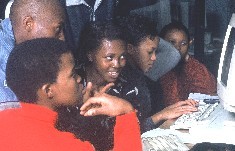'Ubuntu' university lifts off
18 November 2002
CIDA City Campus has turned the traditional model of higher education on its head. Partnership based, community oriented, technology driven, the university provides world-class education to disadvantaged students at a fraction of the normal cost. Sound impossible?
Now, the CIDA model is being seen by many as a solution to the problem of access to higher education for developing countries worldwide.
CIDA (Community and Individual Development Association) City Campus, a remarkable private university in the heart of Johannesburg's CBD, was officially inaugurated by Education Minister Kader Asmal this month.
The campus, which is in its third year of operation, currently has 1 600 students on scholarships valued at R64-million. At the function it was announced that 1 000 further scholarships, funded by the private sector and valued at R40-million, are being offered for 2003, with 10% of them reserved for students in the African Union as a contribution to
the New Partnership for Africa's Development (Nepad).
The university aims to have 5 000 to 9 000 students in the Johannesburg city centre within the next five years, and then to replicate CIDA in other provinces.
CIDA provides a fully accredited, practical four-year Bachelor of Business Administration qualification that emphasises entrepreneurship, business science and technology – with up to three times the normal tutoring hours, at less than a tenth of the normal cost.
Tuition and books cost students just R350 in their first year, and then R150 per month in subsequent years. The cost to the institution is about R2 500 per student per year – 10 times lower than that of South Africa’s 21 formal universities.
Teach one, teach 1 000
The answer to CIDA’s cost-cutting lies in innovation. From the outset, the campus harnessed multimedia technology in its lecture rooms, got the students involved in the day-to-day running of the university, and set up
partnerships with a range of companies and other institutions which enabled them to secure “donations in kind”, study and other materials, and the teaching services of private sector professionals.
The students assist with administration work, computer maintenance, admissions, marketing, research, computer training and the running of the canteen, allowing them to learn and get work experience simultaneously.
“The intention of CIDA is to produce workplace-ready graduates”, says CIDA co-founder and executive director Conrad Mhlongo. “For this reason, we use course material from industry associations and organisations who also lecture the students. So, for example, our investment component is approved by the South African Institute of Financial Markets, and our accounting degree is taught by PricewaterhouseCoopers. Our IT modules are taught by Dimension Data and other leading global IT companies.”
Graduates are not guaranteed jobs, and for this reason entrepreneurship is a
compulsory subject. Students are expected to produce business plans and start businesses in teams for credits, and a venture capital fund is being set up to provide students with the means to start their own business.
Students are also required to return to their home schools and communities, for which they are trained to teach courses such as financial management, starting and running a small business, and health issues.
In October 2001, CIDA students taught 300 000 young people about Aids and money management in communities throughout South Africa. “Students have by now reached around one million unemployed people throughout the country”, says Mhlongo. “CIDA has inverted a slogan: ‘It takes a child to raise a village’ – from the common saying ‘It takes a village to raise a child’.
“The institution provides an African solution to African issues, and is therefore proving highly effective in remedying situations that leading educators had said were impossible to
solve.”
Academic excellence, willingness to participate
CIDA’s students come from economically deprived communities across South Africa as well as other African Union countries, selected on the basis of academic excellence, leadership ability and willingness to participate actively in the transformation of society.
According to Mhlongo, over 17 000 applications have been received in the three years of operation. “We only accept South Africa’s most exceptional students. They need to be academically outstanding, have strong English and mathematical skills, want to complete a business or management degree, and must have displayed proven leadership ability. The search is on to find 1 000 of Africa’s best for the 2003 intake.”

CIDA chief executive Taddy Blecher, an actuary and former management consultant, says: “CIDA realised something groundbreaking had to be done to
open mass-scale access to higher education when we discovered that South Africa has a tertiary education rate of only 6% of people over the age of 20. We also found that there is a 90% correlation between the levels of tertiary education in a nation and its economic success.
“In the US, one of the wealthiest nations in the world, 80% of its population go on to study after high school. For South Africa to enhance its globally competitive position it would need at least 12-15% of our population to have some type of tertiary education.”
Costs of tertiary education are generally very high. In South Africa the average cost to the country to educate a university student per year is around R35 000 to R40 000 per annum, and over R100 000 for a degree. However, only 15% of students currently graduate with their degree or diploma.
“Therefore the true cost of producing a graduate could be considered in many cases to be between R700 000 and R1.3 million”, says Blecher. “We believe that
a low-cost, high-quality, innovative solution is therefore of critical importance for the long-term social stability, progress and competitiveness of Africa in a global marketplace.”
Private sector backing
The institution is funded by the private sector, in particular by founding partners are Investec, Monitor Company and Puregas, "platinum" partners Investec, First National Bank, Dimension Data, KPMG, MTN and the Kellogg Foundation, and "gold" partners African Bank and Corpcapital.
In addition, Microsoft has donated software, McGraw Hill has donated R90-million worth of books, all technology equipment comes from from Amalgamated Appliances, and the accountancy degree is courtesy of PricewaterhouseCoopers.
Investec, which donated the use of its former head office to house CIDA, has begun using its international reach to raise the profile of the campus, and has agreed to assist in setting up a fund to support the university's long-term
sustainability.
"Investec has embraced the concept of the world's first truly low-cost university from its inception", Investec CEO Stephen Koseff said in a statement. "By donating the use of our building, our time, computers and other infrastructural assistance and a long list of resources - including many hours of tutorial by our staff - our employees all over the world share an affinity and commitment to CIDA
"From our initial contact with Taddy Blecher, who had little more than a phone and a desk and a bold idea, we knew that supporting him made sense for Investec. Broadening access to education, the single most important building block with which we can construct a strong and visionary pool of future business leaders, is vital for South Africa and our business."
SouthAfrica.info reporter
 CIDA chief executive Taddy Blecher, an actuary and former management consultant, says: “CIDA realised something groundbreaking had to be done to
open mass-scale access to higher education when we discovered that South Africa has a tertiary education rate of only 6% of people over the age of 20. We also found that there is a 90% correlation between the levels of tertiary education in a nation and its economic success.
“In the US, one of the wealthiest nations in the world, 80% of its population go on to study after high school. For South Africa to enhance its globally competitive position it would need at least 12-15% of our population to have some type of tertiary education.”
Costs of tertiary education are generally very high. In South Africa the average cost to the country to educate a university student per year is around R35 000 to R40 000 per annum, and over R100 000 for a degree. However, only 15% of students currently graduate with their degree or diploma.
“Therefore the true cost of producing a graduate could be considered in many cases to be between R700 000 and R1.3 million”, says Blecher. “We believe that
a low-cost, high-quality, innovative solution is therefore of critical importance for the long-term social stability, progress and competitiveness of Africa in a global marketplace.”
Private sector backing
The institution is funded by the private sector, in particular by founding partners are Investec, Monitor Company and Puregas, "platinum" partners Investec, First National Bank, Dimension Data, KPMG, MTN and the Kellogg Foundation, and "gold" partners African Bank and Corpcapital.
In addition, Microsoft has donated software, McGraw Hill has donated R90-million worth of books, all technology equipment comes from from Amalgamated Appliances, and the accountancy degree is courtesy of PricewaterhouseCoopers.
Investec, which donated the use of its former head office to house CIDA, has begun using its international reach to raise the profile of the campus, and has agreed to assist in setting up a fund to support the university's long-term
sustainability.
"Investec has embraced the concept of the world's first truly low-cost university from its inception", Investec CEO Stephen Koseff said in a statement. "By donating the use of our building, our time, computers and other infrastructural assistance and a long list of resources - including many hours of tutorial by our staff - our employees all over the world share an affinity and commitment to CIDA
"From our initial contact with Taddy Blecher, who had little more than a phone and a desk and a bold idea, we knew that supporting him made sense for Investec. Broadening access to education, the single most important building block with which we can construct a strong and visionary pool of future business leaders, is vital for South Africa and our business."
SouthAfrica.info reporter
CIDA chief executive Taddy Blecher, an actuary and former management consultant, says: “CIDA realised something groundbreaking had to be done to
open mass-scale access to higher education when we discovered that South Africa has a tertiary education rate of only 6% of people over the age of 20. We also found that there is a 90% correlation between the levels of tertiary education in a nation and its economic success.
“In the US, one of the wealthiest nations in the world, 80% of its population go on to study after high school. For South Africa to enhance its globally competitive position it would need at least 12-15% of our population to have some type of tertiary education.”
Costs of tertiary education are generally very high. In South Africa the average cost to the country to educate a university student per year is around R35 000 to R40 000 per annum, and over R100 000 for a degree. However, only 15% of students currently graduate with their degree or diploma.
“Therefore the true cost of producing a graduate could be considered in many cases to be between R700 000 and R1.3 million”, says Blecher. “We believe that
a low-cost, high-quality, innovative solution is therefore of critical importance for the long-term social stability, progress and competitiveness of Africa in a global marketplace.”
Private sector backing
The institution is funded by the private sector, in particular by founding partners are Investec, Monitor Company and Puregas, "platinum" partners Investec, First National Bank, Dimension Data, KPMG, MTN and the Kellogg Foundation, and "gold" partners African Bank and Corpcapital.
In addition, Microsoft has donated software, McGraw Hill has donated R90-million worth of books, all technology equipment comes from from Amalgamated Appliances, and the accountancy degree is courtesy of PricewaterhouseCoopers.
Investec, which donated the use of its former head office to house CIDA, has begun using its international reach to raise the profile of the campus, and has agreed to assist in setting up a fund to support the university's long-term
sustainability.
"Investec has embraced the concept of the world's first truly low-cost university from its inception", Investec CEO Stephen Koseff said in a statement. "By donating the use of our building, our time, computers and other infrastructural assistance and a long list of resources - including many hours of tutorial by our staff - our employees all over the world share an affinity and commitment to CIDA
"From our initial contact with Taddy Blecher, who had little more than a phone and a desk and a bold idea, we knew that supporting him made sense for Investec. Broadening access to education, the single most important building block with which we can construct a strong and visionary pool of future business leaders, is vital for South Africa and our business."
SouthAfrica.info reporter
 Technology-enriched education
Technology-enriched education
 CIDA boasts 98% student attendance rates
CIDA boasts 98% student attendance rates



